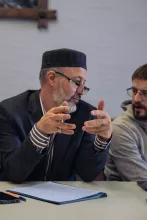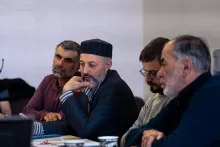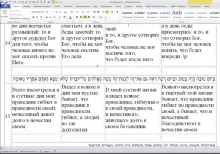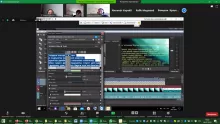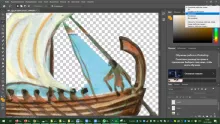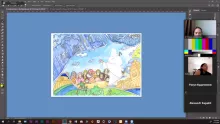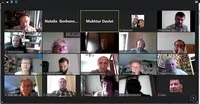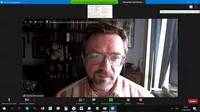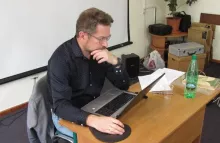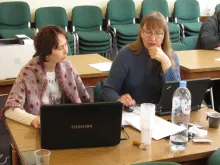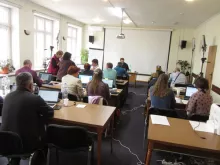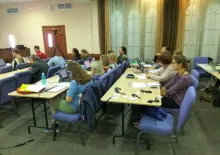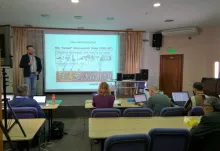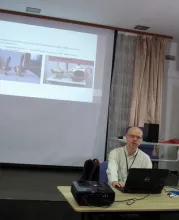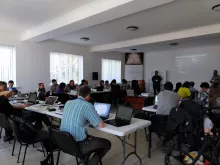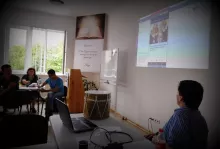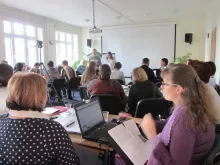news-20012024
From January 15 to 20, the Institute for Bible Translation held a practical seminar on oral Bible translation (OBT) in Makhachkala.
Translators and exegetical advisers from the Tsudakhar, Godoberi, Chamalal andl Karata projects participated in this event. All four of these non-written languages belong to the Nakh-Dagestani language family. The oral nature of the use of these languages by their speakers determined the choice of the oral Bible translation methodology for them.
The workshop started with an introduction to the methodology of the translation process, providing the participants with a solid foundation for their practical exercises. The practical segment of the workshop focused on the 1st chapter of the book of Ruth, allowing the participants to apply the newly acquired knowledge and skills to a specific biblical text...
newsletter-01122023

news-14102022
On October 10-14 IBT conducted a webinar for Bible translation teams from IBT and partner organizations on the Old Testament book of Ecclesiastes. 14 participants from seven Bible translation projects (Avar, Kyrgyz, Tabasaran, Khakass, Tsakhur, Yakut and a North Caucasian project) gathered online for this training event. The webinar was taught by Luka Manevich, a biblical scholar and exegetical adviser in several Scripture translation projects, already familiar to many of the students from his expert instruction at previous webinars.
newsletter-080920
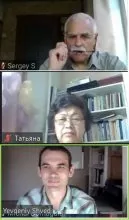
Here is Mal 2:2 in the Revised Standard Version: “If you will not listen, if you will not lay it to heart to give glory to my name, says the Lord of hosts, then I will send the curse upon you and I will curse your blessings; indeed I have already cursed them, because you do not lay it to heart.” What is a “blessing”? And a “curse”? When using these words today...
news-150720
articles-22062020
IBT held a translation workshop on two of the Minor Prophets via Zoom on June 11-18. This was the first time in IBT’s history that one of our workshops has been conducted as a webinar.
The online format of this workshop was necessitated by the coronavirus pandemic and the related quarantine measures. Nevertheless, its advantages quickly became apparent. Many IBT translators are university instructors, and for them, June is traditionally a very busy time, full of summer courses and entrance exams. Translation team members who would not have been able to come to Moscow for a face-to-face seminar were still able to find time in their busy academic schedules for full participation in the virtual workshop.
news-181019
On October 9-17, the Institute for Bible Translation held a workshop on Minor Prophets Translation Issues. It was attended by translation teams from eleven language groups (Adyghe, Avar, Balkar, Erzya, Kabardian, Kumyk, Kyrgyz, Mari, Tabasaran, Tajik, and Yakut). The discussion was headed by IBT consultant Andrei Desnitsky and by Yevgeniy Shved, the exegetical advisor in several of IBT's translation projects. The workshop focused on the text and translation issues of three minor prophets (Zephaniah, Joel, Haggai).
news-181018
How should a translator approach the Pentateuch, the first five books of the Bible, called “Torah” in Hebrew? How does one begin the translation of this foundational part of the Old Testament? How can translators avoid getting buried under the many minute details in the ancient text that modern readers are usually not aware of? How can one find the spiritual and meaning core of these texts? Without a doubt, any translator of the Pentateuch must face these questions.
news-080618
In June 4-8, 2018, in the city of Nalchik, the Institute for Bible Translation held a seminar on "Translation of the Holy Scripture in Caucasian Languages: Scripture Engagement Stage". The seminar was attended by 30 participants from 9 IBT translation projects, namely Adyghe, Balkar, Dargi, Kabardian, Karachai, Ingush, Lak, Lezgi and Tabasaran.
news-301017
How does one translate in such a way that the information relevant in one culture at a certain time would be communicated with the same relevance in a different culture at a different time? What does one need to be mindful of in order to impact a contemporary audience in the same way that the original audience was impacted? What Biblical materials are relevant for a particular audience?


